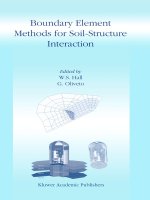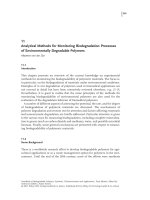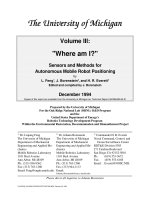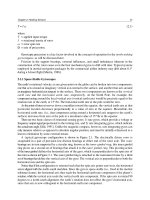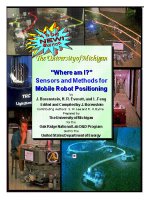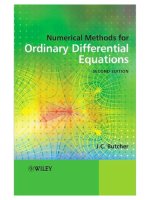Unit 6 methods for generating electricity
Bạn đang xem bản rút gọn của tài liệu. Xem và tải ngay bản đầy đủ của tài liệu tại đây (179.25 KB, 10 trang )
Unit 6: Methods for generating
electricity
I
READING AND COMPREHENSION
METHODS OF GENERATING ELECTRICITY
Methods for transforming other power into electrical power
Rotating turbines attached to electrical generators produce most commercially available
electricity. Turbines may be driven by using steam, water, wind or other fluids as an
intermediate energy carrier. The most common usage is by steam in fossil fuel power plants or
5 nuclear power plants, and by water in hydroelectric dams. Small mobile generators are often
driven by diesel engines, especially on ships, remote building sites or for emergency standby.
Fuel cells produce electricity using a variety of chemicals and are seen by some people to be
the most likely source of power in the long term, especially if hydrogen can be used as the
feedstock. However, hydrogen is usually only an energy carrier, and must be formed by some
10 other power source.
Primary energy sources used in electrical power generation
15
20
25
30
The world relies mainly on coal and natural gas for power.
The high capital requirements of nuclear power and the fear
of
its dangers have prevented the ordering of new nuclear
power plants in North America since the 1970s.
Steam turbines can be powered using steam produced from
geothermal sources, solar energy, or nuclear reactors, which
use the energy created by the fission of radioactive
plutonium or uranium to generate heat. Nuclear power
plants often use a primary and secondary steam circuit to
add an additional layer of protection between the location
of the nuclear fuel and the generator room.
Hydroelectric power plants use water flowing directly
through the turbines to power the generators. Tidal harnesses
use the force of the moon on bodies of water to spin a
turbine. Wind turbines use wind to turn turbines that are
hooked up to a generator. Pumped-storage hydroelectricity is
used to level demands on the power grid.
Power generation by thermonuclear fusion has been suggested as a possible way of generating
electricity; currently a number of technical obstacles and environmental concerns stand in the
way, but if realized fusion might provide a relatively clean and safe source of electrical power.
The construction of a large experimental reactor (ITER) is expected to commence in 20052006.
37
35
Improving efficiency
Co-generation (combined heat and power) plants combine the generation of electricity and
heat using solar power, fossil fuels, syngas, biomass, or biogas as a fuel source. These plants
can achieve efficiencies as high as 80%, but many of these plants being built today only
expect to achieve stated maximum 55% efficiency. Heated steam turns a turbine, and then
40 excess heat is distributed for space heating in buildings, industrial processes or green house
heating. Whole communities can benefit from heat distributed through a district heating
scheme.
The ability to achieve tri-generation using fossil fuels or solar energy to generate heat,
electricity and evaporative cooling exists. These combined power plants have the best energy
45 conversion ratio after hydroelectric plants. Small photovoltaic arrays, windmills and bicycles
hooked up to a turbine can all be used to generate mobile electricity.
Task 1
Rephrasing
Rewrite the following sentences, replacing the words in italics with expressions
from the passage which have similar meanings:
1. Small mobile generators are often driven by diesel motors, especially on ships, remote
building sites or for emergency standby.
2. The world depends mainly on coal and natural gas for power.
3. Tidal harnesses use the force of the moon on bodies of water to turn a turbine.
4. Pumped-storage hydroelectricity is used to level needs on the power grid.
5. Co-generation (combined heat and power) plants integrate the generation of electricity
and heat using solar power, fossil fuels, syngas, biomass, or biogas as a fuel source.
Task 2
Contextual reference
What do the words in italics in these sentences refer to?
1. The high capital requirements of nuclear power and the fear of its dangers have prevented
the ordering of new nuclear power plants in North America since the 1970s. (line 15)
(a) The high capital requirement’s
(b) Nuclear power’s
(c) New nuclear power plant’s
2. Steam turbines can be powered using steam produced from geothermal sources, solar
energy, or nuclear reactors, which use the energy created by the fission of radioactive
plutonium or uranium to generate heat. (line 19)
(a) Steam turbines
(b) Geothermal sources
(c) Nuclear reactors
3. Wind turbines use wind to turn turbines that are hooked up to a generator. (line 27)
(a) Steam turbines
(b) Wind turbines
(c) Turbines
Task 3
Checking facts and ideas
38
Decide if these statements are true or false. Quote from the passage to support your
decisions.
1. Steam, water, wind are used as an intermediate energy carrier to drive turbines.
2. The world relies only on coal and natural gas for power.
3. In hydroelectric power plants, water flows directly through the turbines to power the
generators.
4. Thermonuclear fusion has been used to generate electricity.
5. Power generation by thermonuclear fusion has great potential because it might provide a
relatively clean and safe source of electrical power.
6. As estimated, the construction of a large experimental reactor will commence in 20052006.
7. Co-generation plants achieve efficiencies as high as 80%.
8. Heated steam only used to turn turbines.
9. Tri-generation power plants have the best energy conversion ratio after hydroelectric
plants.
10. Small photovoltaic arrays, windmills and bicycles can all be used to generate mobile
electricity.
II
USE OF LANGUAGE
Task 4
Describing purpose
When we answer the question What is X for?, we describe the purpose of X.
EXAMPLE
What is a voltmeter for?
We can use the following ways to describe the purpose of a voltmeter:
1. It is used for measuring voltage.
2. It is used to measure voltage.
3. We measure voltage with an ammeter.
4. We measure current using an ammeter.
Now describe the purpose of these instruments and facilities using of the structures
presented above.
1. A battery charger
2. A megohmmeter
3. A radiator
4. A waveform display equipment
5. A signal generator
6. A turbine
7. A current transformer
39
8. A protective relay
9. A full cell
10. Pumped-storage hydroelectricity
Task 5
Relative clauses 2: making definitions
Study these two sentences:
1. The insulators are deteriorated.
2. The insulators are contaminated.
We can link them in two ways using a relative clause:
1. The insulators WHICH ARE CONTAMINATED are deteriorated.
2. The insulators, WHICH ARE CONTAMINATED, are deteriorated.
Sentence 1 means that only the contaminated insulators are deteriorated. Other
insulators such as silicon coated insulators are not deteriorated. The relative clause is a
defining one. It defines the type of insulators which are contaminated. It carries
essential information.
Sentence 2 means that all the insulators are deteriorated and all the insulators are
contaminated. The relative clause is a non-defining one. It adds some extra
information to the sentence but it is not essential. We can remove it from the
sentence and the sentence still makes good sense. It is separated from the rest of the
sentence by commas.
One use of defining relative clauses is to make definitions. Study this diagram:
(a) An electric motor
(b) a machine
is
which
(c) converts electrical energy
into mechanical energy
Now make ten definitions using the information in the following table. You must
decide on the correct combinations of (a), (b), and (c).
Apparatus
the tools or other pieces of equipment that are needed for a particular
activity or task
Device
an object or a piece of equipment that has been designed to do a
particular job
Machine
a piece of equipment with moving parts that is designed to do a
particular job
Instrument
A tool or device used for measuring speed, distance, temperature, etc.
in a vehicle or on a piece of machinery
Equipment
the things that are needed for a particular purpose or activity
40
(a)
Porcelain
A radiator
A transducer
A circuit breaker
Thermo tracer
A transformer
A generator
A miliammeter
A governor
Copper
III
(b)
(c)
an instrument
a device
an equipment
a machine
an apparatus
a material
controls the rotational speed of turbines
converts mechanical energy into
electrical energy
changes the magnitude of an ac voltage
measures small currents
dismisses heat from equipment
does not readily release electrons
provide an easy path for an electric
current
converts changes in the physical
variable into electrical signals
protects power system from excessive
currents
measures temperature using infrared
rays
INFORMATION TRANSFER
Task 6
Describing component values
Study this table:
Prefix
Symbol
Multiple
Example
Giga
G
109
GHz
Gigahertz
Mega
M
106
MBar
Megabars
kilo
k
103
kA
Kiloamps
deci
d
10-1
dB
Decibels
milli
m
10-3
mV
Millivolts
micro
µ
10-6
µs
Microsecs
nano
n
10-9
nF
Nanofarads
pico
p
10-12
pF
picofarads
41
Identify the components in the following circuit and write out their value in full:
F
1.25A
1.4mH
1000µF
16V
L1
R4
C2
25V
100µF
R1
22kΩ
C4
68nF
39kΩ
R6
C6
1kΩ
+14V
BC328
BC148
C1
2.2µF
63V
R2
C5
15nF
82kΩ
R5
C3
BD433
R7
R8
100Ω
100Ω
BC148
1kΩ
470µF
10V
BD434
C7
100µF
16V
R9
R3
120Ω
RL
3.3Ω
1/2W
2Ω or 4Ω
42
IV
GUIDED WRITING
Task 7
Sentence building
Join the following groups of sentences to make the longer sentences. Use the words
printed in italics at the beginning of each group. You may omit words and make
whatever changes you think are necessary in the word order and punctuation of the
sentences.
1. when
Electricity is generated.
A loop of conducting wire rotates in a magnetic field.
2. however
Fuel cells produce electricity using a variety of chemicals and are seen by some
people to be the most likely source of power in the long term, especially if
hydrogen can be used as the feedstock.
Hydrogen is usually only an energy carrier, and must be formed by some other
power source.
3. as
Co-generation gas turbines (COGT) offer efficiencies of up to 60%.
They generate power both directly by combustion of natural gas and also use
residual heat to generate electricity from steam.
4. which
Geothermal power generation is an environmentally friendly power generation
method.
Geothermal power generation produces only 1/20th of CO 2 emissions per a unit of
electricity generated compared with thermal power generation.
5. before
The connection between magnetism and electricity was discovered.
Generators used electrostatic principles.
6. because
Copper is used in many wires.
Copper has a lower resistance than many other metals.
7. after, that
Electricity is produced at power plants.
Electricity has to get to the customers.
The customers use the electricity.
8. although
Nuclear power stations have a good safety record.
There have been some well-known accidents such as Chernobyl.
43
9. while
In the 21st century, nations must optimize use of low-quality fossil fuels and
sustainable-source energy.
Nations must give equal consideration to resource depletion, environment
protection, and the varying economic considerations affecting all nations.
10. whether
Regardless of the prime mover we can interface a control system to fit your
specification.
It is a standard application or a custom designed control system.
V
READING AND SUMMARIZING
Study this passage carefully and answer the questions which follow:
FOSSIL FUEL POWER PLANT
A fossil fuel power plant (FFPP) (also known as steam electric power plant in the
US, thermal power plant in Asia, or power station in the UK) is an energy
conversion center designed on a large scale for continuous operation. Just as a battery
converts relatively small amounts of chemical energy into electricity for temporary or
intermittent use, the FFPP converts the energy stored in fossil fuels such as coal, oil, or
natural gas successively into thermal energy, mechanical energy, and finally electric
energy for continuous use and distribution across a wide geographic area. Each FFPP
is a highly complex, custom-designed system. Present construction costs (as of 2004)
44
run to $1300/kW, or $650 million USD for a 500 MWe unit. Multiple generating units
may be built at a single site for more efficient use of land, resources, and labor. The
operational descriptions below are typical for a large plant and will vary from one
plant to the next.
Fuel transport and delivery
Coal may be delivered by transport truck or railroad cars. A large coal train may be
nearly a mile long, containing 100 cars, each with 100 tons of coal, for a total load of
10,000 tons. Modern unloaders use rotary dump devices. The unloader includes a train
positioner arm that moves the entire train to position a car over a coal hopper. The
dumper clamps an individual car against a platform, which swivels the car upside
down to dump the coal. Swiveling couplers enable the entire operation to occur while
the cars are still coupled together. Unloading a train takes about three hours. Older
unloaders may still use bottom dump rail cars. Generating stations adjacent to a mine
sometimes haul coal with massive diesel-electric drive trucks with 140 ton capacity.
Trucks this large typically have 8 ft (2.5 m) diameter tires, too big and heavy to be
licensed for highway use.
For startup or auxiliary purposes, the plant may use no. 2 or no. 5 fuel oil as well, Fuel
oil may be delivered by tanker truck or train car. It is stored in vertical cylindrical steel
tanks as large as 90,000 barrels (14,000 m 3). The heavier no. 5 "bunker" fuel must be
steam heated before pumping in cold climates.
Natural-gas fuelled plants are usually built adjacent to gas transport pipelines or have
dedicated gas pipelines extended to them.
45
1. How does a fossil fuel power plant work?
2. What does a battery convert into electricity for temporary or intermittent use?
3. Can the FFPP can either converts the energy stored in fossil fuels such as coal, oil,
or natural gas successively orr elatively small amounts of chemical energy into
thermal energy, mechanical energy? Why?
4. What are swiveling couplers for?
5. What is stored in vertical cylindrical steel tanks as large as 90,000 barrels (14,000
m3)?
46
